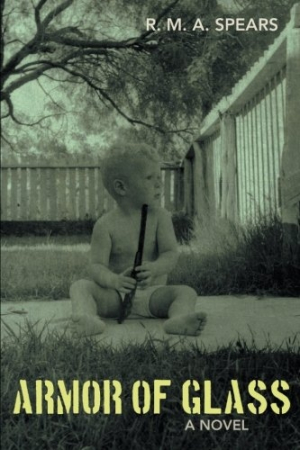
Armor of Glass
A Novel
Keen observations are powerful and build a sense of imagery to reveal how one man’s struggles have shaped his perspective.
Author R. M. A. Spears explores themes of machismo and being a man, while shedding light on military culture, in this masterful story of one man’s struggle to overcome the events that built his armor of glass. Based on a true story, Armor of Glass is a gripping and heartrending novel about one man’s war with his memories, his loves, and his life.
Eli rides the DART (Dallas Area Rapid Transit). As he travels past stations, nodding in and out of sleep, his mind flashes through events of his life that include sexual abuse, disastrous adult relationships, his stints with various military associations that toughened him up, and his complicated, long-lasting friendship with a woman named Cameo.
Spears’s tight writing and detailed descriptions capture the complexity of protagonist Eli. He is dubbed “Brick” by his uncle because his head is, as his mother describes, “like a jawbreaker candy.” This nickname is also appropriate because Brick does his best to get through life by building a wall around himself to cope with his experiences of growing up, navigating through military and civilian life, and being a man—“Men don’t like to open up or emote; we don’t do well with emotions.”
The pace of the narrative captures Eli’s presence on the train. Spears conveys Eli’s tension through the short, clipped sentences and the hypervigilant observations: “a probable illegal” handing out the daily paper; the silent race between train regulars as they hurry to the best spot on the train; and “watch[ing] without appearing to do so.” The cryptic description of Eli—“Have to be conscious of my surroundings, everything within sight and sound, as trained, and to elicit her eyes hunting mine, if there”—sets up the mysterious aspect of this novel as Eli’s relationship with Cameo runs its course.
At times, the images in the protagonist’s stream of consciousness, such as, “dark red pores bored into me, projected from beyond the blacked windshield fore me,” are somewhat obscure, though they are often clearer once the story unfolds. The time frame is also a little unclear because it hops around. However, this is a minor quibble given the strong characterization and deft descriptions of the episodes that make for a stirring read. The memories alternately lull the reader into some idyllic moments (“Baking from scratch was Mom’s loyalty to the old tastier ways before box mixes and frozen dinners”), only to shock them later with brutal images. For example, with the episode where Eli is in battle amid explosions with Private Adams, suddenly, “a fountain of Adams sprayed over me.”
Eli’s keen observations on men’s roles (“Boys play hurt. Men play broken. Men work hurt. Men live broken. It’s the way of the world.”) and morality are candid and hard-hitting: “Parables in the Bible were valuable and precious, but only if everyone else went along with them.” While these statements and observations are powerful and thought-provoking, Spears manages to offer a truly gripping image in the account of eleven-year-old Eli’s brutal rape by his Little League coach, where the author censors the description by blacking out parts of several sentences.
In Armor of Glass, a man relives the events that shaped his cynical view of life. It’s a skillfully crafted literary read.
Reviewed by
Maya Fleischmann
Disclosure: This article is not an endorsement, but a review. The publisher of this book provided free copies of the book and paid a small fee to have their book reviewed by a professional reviewer. Foreword Reviews and Clarion Reviews make no guarantee that the publisher will receive a positive review. Foreword Magazine, Inc. is disclosing this in accordance with the Federal Trade Commission’s 16 CFR, Part 255.

